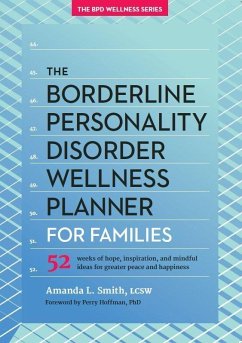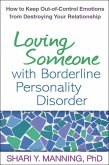Family members and friends of individuals with a diagnosis of borderline personality disorder need support, knowledge, resources, and, above all else, hope for a healthier and happier future.
The Borderline Personality Disorder Wellness Planner for Families provides weekly inspiration and planning tools for parents, spouses, siblings, and partners of those who are suffering with the emotion dysregulation and self-sabotaging behaviors that are associated with borderline personality disorder.
In Part 1, discover the value of taking care of yourself, how to find a well-trained therapist for your loved one, and the necessity of patience with yourself and self-compassion.
Next, in Part 2, take the Self-Care Assessment and then get started with the Weekly Self-Care Tracker. After thirty days, take a new Self-Care Assessment to see how you've grown!
Designed to give you practical ideas based on ideas from dialectical behavior therapy, mentalization-based treatment, and mindfulness, this book will give you what you need to improve your relationship starting today and keep you on track all 52 weeks of the year.
Amanda L. Smith is the author of the popular title, The Dialectical Behavior Therapy Wellness Planner which has sold over 10,000 copies.
The Borderline Personality Disorder Wellness Planner for Families provides weekly inspiration and planning tools for parents, spouses, siblings, and partners of those who are suffering with the emotion dysregulation and self-sabotaging behaviors that are associated with borderline personality disorder.
In Part 1, discover the value of taking care of yourself, how to find a well-trained therapist for your loved one, and the necessity of patience with yourself and self-compassion.
Next, in Part 2, take the Self-Care Assessment and then get started with the Weekly Self-Care Tracker. After thirty days, take a new Self-Care Assessment to see how you've grown!
Designed to give you practical ideas based on ideas from dialectical behavior therapy, mentalization-based treatment, and mindfulness, this book will give you what you need to improve your relationship starting today and keep you on track all 52 weeks of the year.
Amanda L. Smith is the author of the popular title, The Dialectical Behavior Therapy Wellness Planner which has sold over 10,000 copies.
It is both a personal and professional honor for me to write the foreword to The Borderline Personality Disorder Wellness Planner. Meeting Amanda a number of years ago through the organization she created in Florida, I was immediately impressed. Florida Borderline Personality Disorder Association was a landmark accomplishment. To my knowledge, it was the first-ever individual state effort for borderline personality disorder (BPD) and it developed a reputation of national recognition.
The Borderline Personality Disorder Wellness Planner is another unique effort and Amanda has once again has created a wonderful resource. This time a resource specifically for families with a loved one with BPD, the planner offers an opportunity to learn skills while at the same time providing a forum for self-care assessment along with skill acquisition and application.
Based on Dialectical Behavior Therapy (DBT), each page introduces a skill that promotes management of one's emotions and life in more effective ways. DBT skills are well-documented for the individual with BPD and also have been shown to be a good match for families as well.
As the first person to teach DBT skills to families, I saw first hand the changes that were effected from even the initial class meeting (Linehan, 1993, page 37). This planner expands that effort by organizing both skill exposure and self-care assessments into a well-needed, systematic and effective 52 -week program.
Why is a focus on family important? BPD is a disorder that centers on relationships with seven of its nine symptoms having interpersonal impact. In addition, research showed that emotional involvement with the loved one promotes their recovery. Other data looked at the disorder from a different perspective and documented that over 53% of family members met criteria for post traumatic stress disorder based only on witnessing and experiencing their loved one's BPD symptoms. Experiencing high personal stress as a consequence compromises the family member's resilience both emotionally and physically.
Still a very underserved and misunderstood part of the BPD community, the journey of families is a challenging one with highs and lows on any given day. Amanda has conveyed a compassionate understanding and respect for the families on her website and now through the Wellness Planner. Historically that was not the common sentiment. Families were not considered partners in the recovery process. However, in the past decade the tide has fortunately changed and Amanda has devoted time and energy to contribute to that effort. Her message of empathy along with a consistent message of caring and concern both for the sufferer and their relatives has further promoted the needs and rights of family members.
Amanda illustrates the importance of a dialectical perspective not forgetting that the person in recovery is central and yet at the same time that family member needs cannot be ignored. As with professionals, family members also need tools for both their own well-being and also to be able to be a valued resource for their relative. Amanda's innovative way of recognizing families with the planner promotes that importance.
Bravo!
Perry D. Hoffman, PhD, President and co-founder of the National Education Alliance for Borderline Personality Disorder, and Co-creator of Family Connections(TM) Program, www.borderlinepersonalitydisorder.com.
The Borderline Personality Disorder Wellness Planner is another unique effort and Amanda has once again has created a wonderful resource. This time a resource specifically for families with a loved one with BPD, the planner offers an opportunity to learn skills while at the same time providing a forum for self-care assessment along with skill acquisition and application.
Based on Dialectical Behavior Therapy (DBT), each page introduces a skill that promotes management of one's emotions and life in more effective ways. DBT skills are well-documented for the individual with BPD and also have been shown to be a good match for families as well.
As the first person to teach DBT skills to families, I saw first hand the changes that were effected from even the initial class meeting (Linehan, 1993, page 37). This planner expands that effort by organizing both skill exposure and self-care assessments into a well-needed, systematic and effective 52 -week program.
Why is a focus on family important? BPD is a disorder that centers on relationships with seven of its nine symptoms having interpersonal impact. In addition, research showed that emotional involvement with the loved one promotes their recovery. Other data looked at the disorder from a different perspective and documented that over 53% of family members met criteria for post traumatic stress disorder based only on witnessing and experiencing their loved one's BPD symptoms. Experiencing high personal stress as a consequence compromises the family member's resilience both emotionally and physically.
Still a very underserved and misunderstood part of the BPD community, the journey of families is a challenging one with highs and lows on any given day. Amanda has conveyed a compassionate understanding and respect for the families on her website and now through the Wellness Planner. Historically that was not the common sentiment. Families were not considered partners in the recovery process. However, in the past decade the tide has fortunately changed and Amanda has devoted time and energy to contribute to that effort. Her message of empathy along with a consistent message of caring and concern both for the sufferer and their relatives has further promoted the needs and rights of family members.
Amanda illustrates the importance of a dialectical perspective not forgetting that the person in recovery is central and yet at the same time that family member needs cannot be ignored. As with professionals, family members also need tools for both their own well-being and also to be able to be a valued resource for their relative. Amanda's innovative way of recognizing families with the planner promotes that importance.
Bravo!
Perry D. Hoffman, PhD, President and co-founder of the National Education Alliance for Borderline Personality Disorder, and Co-creator of Family Connections(TM) Program, www.borderlinepersonalitydisorder.com.








